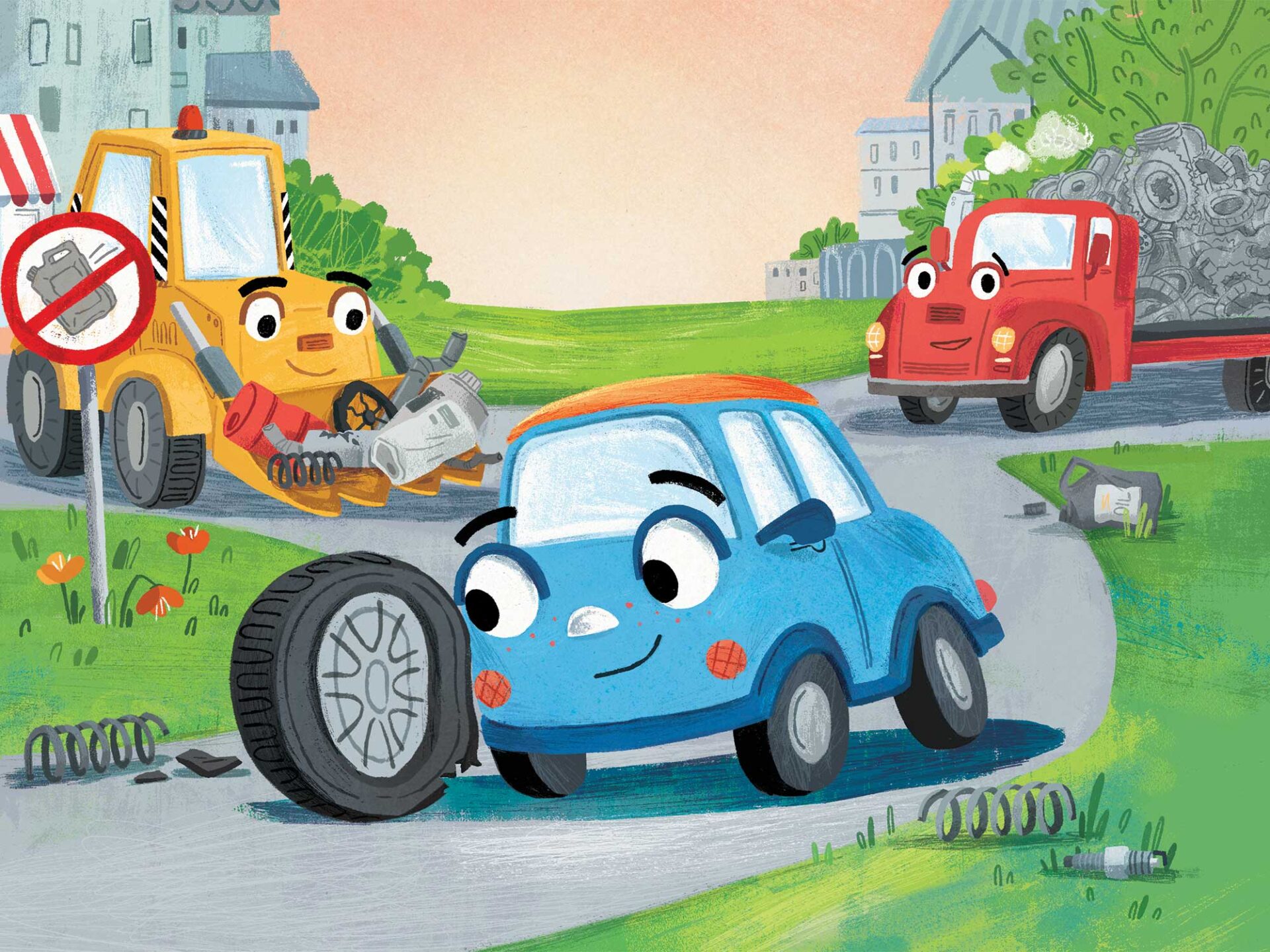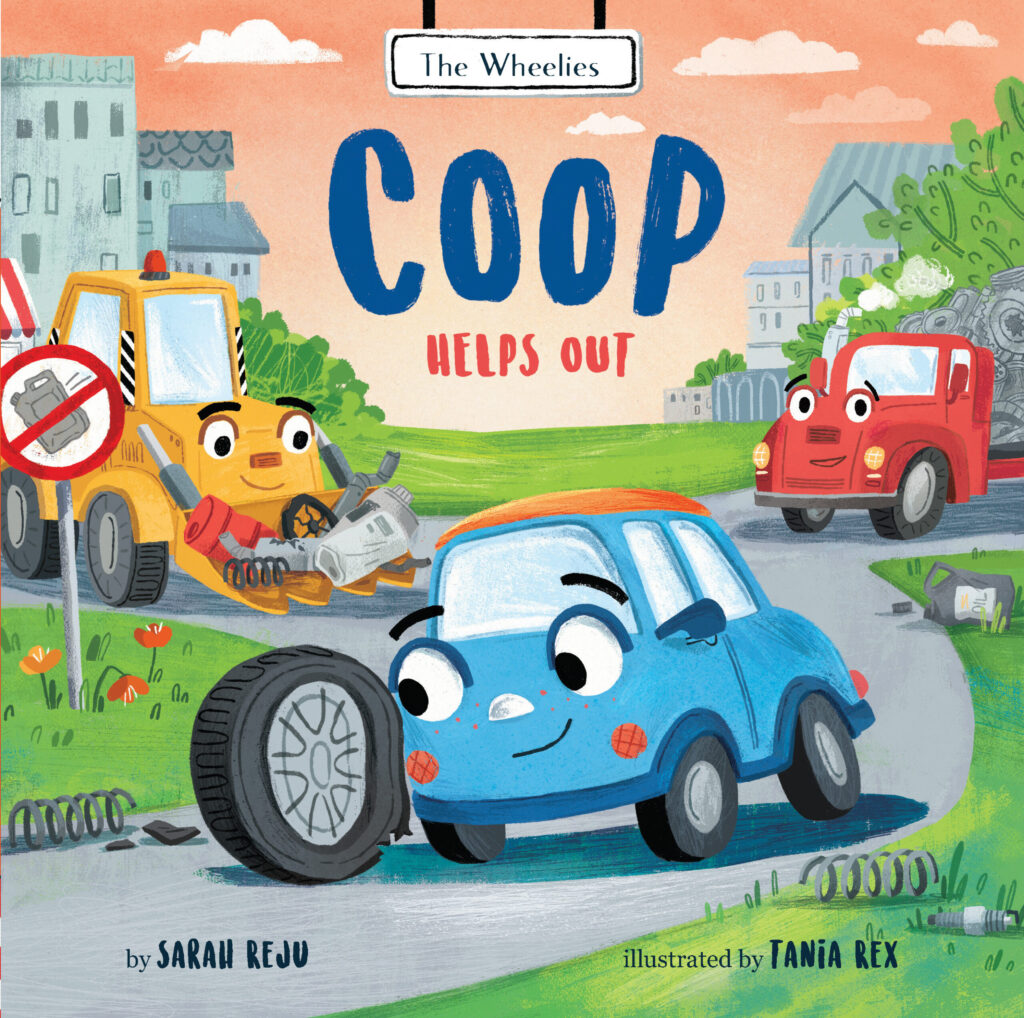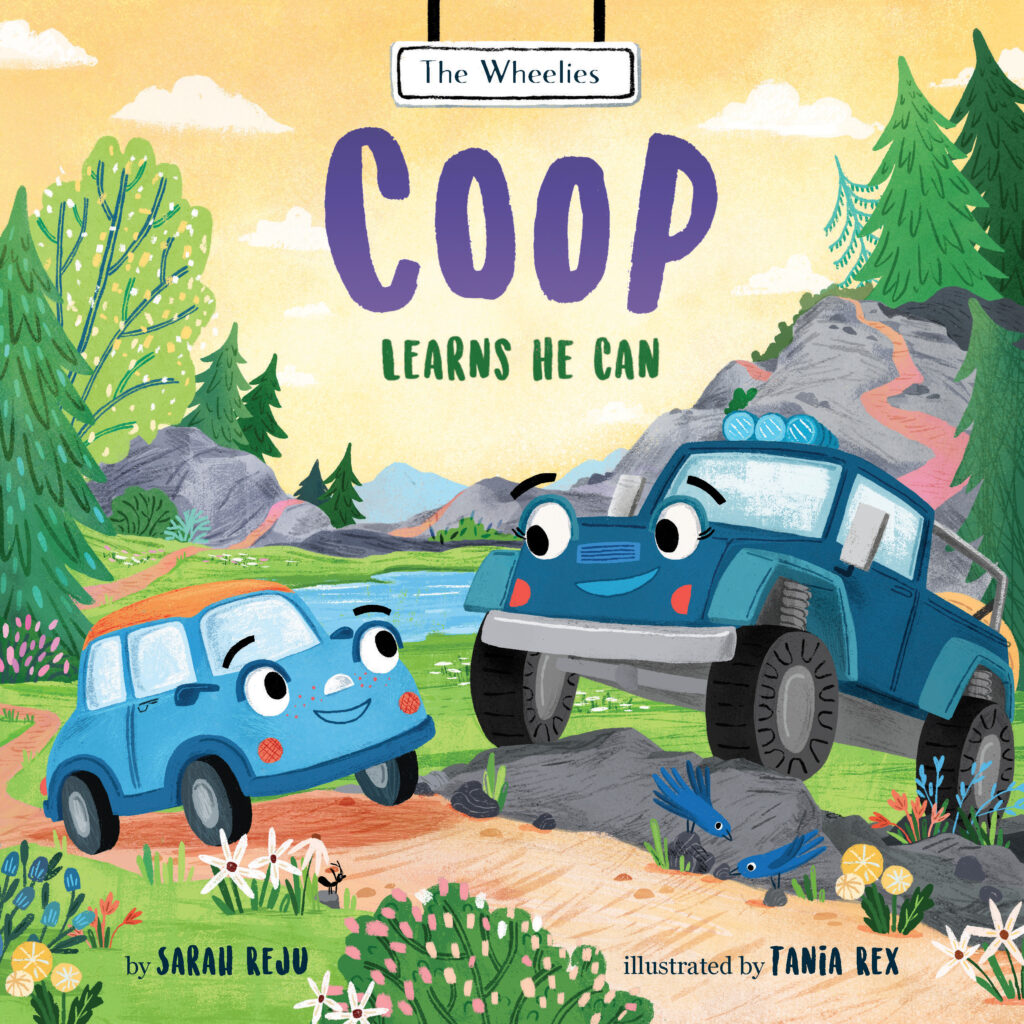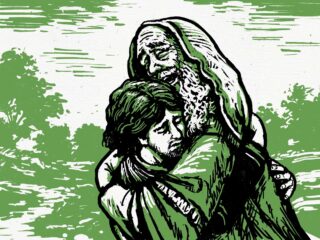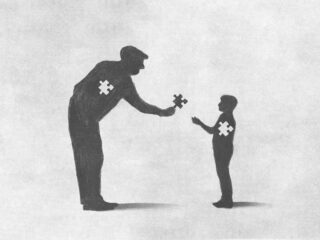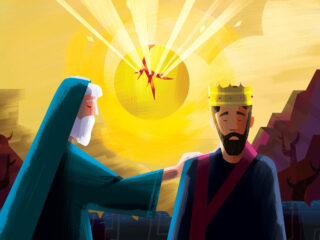Do you know a child who loves to play with cars? Maybe a little one fascinated with big trucks? Then, The Wheeles, a series of books written by Sarah Reju and illustrated by Tania Rex, is sure to be right up their alley.
The Wheelies are a family of vehicles whose adventures are both fun and relatable to children ages 3–8. And when trouble finds young Coop, as it always seems to do, the truth of the gospel always steers him back in the right direction.
In Coop Helps Out, the youngest member of the Wheelie family learns that by serving others, we can serve Jesus. When Demas, the son of a world-famous race car, makes fun of how Pops’ job as the town garbage truck makes him dirty and smelly, Coop starts to wish his father had a more popular, cleaner, cooler job. But when Pops gets sick, Coop learns how important being a garbage truck really is and steps in to help clean up the town. Coop discovers that his father’s humble, selfless service points to Jesus, the best servant of all, who came to clean up the mess in our hearts.
Coop learns that he is fearfully and wonderfully made by God in Coop Learns He Can. Coop dreams of doing big, important things like his older siblings do. He is excited to go off-roading with Joy, a Jeep, but as a MINI-Cooper, he can’t keep up. Coop becomes sad that he isn’t built to climb rocks and fling mud like his sister and wonders if the Bible verse they had been memorizing about being fearfully and wonderfully made applies to him. When Joy gets stuck and needs her brother’s speed and agility to rescue her, Coop realizes that God did give him special talents of his own.
In this interview with author Sarah Reju, we learn more about the series and the important lessons children can learn from Coop.
(Read Sarah’s interview on the first book in the series, Coop Messes Up here.)
Q: For those who may not be familiar with The Wheelies, please introduce us to the series and cast of characters.
Coop Wheelie is the youngest member of a family of vehicles who live in Capital City. He’s an energetic Mini Cooper whose frequent mistakes and struggles help him learn big truths about God. In addition to Coop, the Wheelie family includes siblings Nory, a fun-loving VW Beetle, Lucy, a rule-following police car, Joy, an adventure loving Jeep, and James, a dependable pickup truck. Ma is a hard-working fire truck, and Pops is a servant-hearted garbage truck.
Q: In Coop Helps Out, Coop starts off a little embarrassed about what his father does for a living. Why does Demas, the son of a racecar, tease Coop about his dad?
Demas thinks his father’s job as a world-famous race car is much better than the unglamorous, stinky work that Coop’s dad, Pops, does as a garbage truck. Demas feels better about himself when he makes Coop feel small.
Coop had always loved and admired Pops, but Demas’s comments plant a seed of doubt in his mind. Unfortunately, Coop listens to Demas and starts to believe that Pops’s job is embarrassing. Coop, turned off by the smell of garbage, refuses to pull Pops’s crusher lever like he had always done before. Then, when Pops gets sick, Coop thinks that he is responsible.
Q: What happens to Pops that puts Coop in a position where he needs to start helping clean up the town?
Pops gets sick and is unable to work for several days. Trash starts to pile up around the City. Coop has a talk with the town fuel truck, Phil Junior, who helps him understand how valuable Pop’s humble work is to the City. He notices the difference in the City when Pops isn’t there to clean up.
Coop realizes that somebody needs to get busy cleaning up the City. So he starts gathering trash into piles. Others in the City are inspired by Coop’s example and come out to help. In the process of cleaning, Coop gets stinky and dirty, just like Pops. Ma needs to hose him down at the end to wash off all the grime from his hard work.
Q: Why is serving others important, and why is it best for children to start learning about service to others at a young age?
There are lots of practical reasons why children should learn to serve joyfully. We want them to learn to be good neighbors and productive members of society. Developing a strong work ethic now will equip them for the future to provide for themselves, their families, and others in need. Kids should help out because adults are busy and tired and need help getting the basic tasks of life done. Kids also feel empowered when they know they are contributing members of the family. Serving people out in the community can even help kids grow in gratitude for blessings they previously took for granted.
But even more importantly, serving can be a gateway to knowing Jesus more. Jesus is the Savior who came not to be served but to serve, and to give his life as a ransom for many (Mark 10:45). The greatest in Jesus’s kingdom are actually the servants. Jesus has already done the most important work, in dying for our sins and rising again. The work we do will not save us, but it will help us get to know Jesus better as we become more like him. Love for our neighbors is an overflow of love for God. We serve Jesus by serving the people around us (Matthew 25:35–40).
The earlier kids can learn to help, the better. Many young kids enjoy helping out by doing the things they see parents and older siblings doing. Including them in serving communicates that they are contributing members of the family. If you wait until they are older to expect them to help out, they’re likely to have grown accustomed to being served, rather than serving.
Q: What does Coop learn about being a servant like Jesus from Phil Junior?
Coop learns to appreciate how Pops helps out, quietly giving his life for the good of the town. Pops gets tired and dirty cleaning up everyone’s messes, but he never complains. Coop feels proud that his father is a garbage truck. His work is humble and very valuable.
Phil Junior shows Coop how Pops’s humble service reminds us of Jesus. Jesus deserved to be king, but instead chose to be the humblest servant who ever lived. He gave his life for sinners, and when a person trusts in him, Jesus cleans up the mess of sin in their heart.
Q: What do you hope all children will learn about living a life of service from reading Coop Helps Out?
I hope children will learn about the best and humblest servant of all, Jesus, and that they will want to follow him. In getting to know Jesus, kids will grow in their desire to serve others. Love for our neighbors overflows out of love for God. Kids can serve Jesus by serving the people around them (Matthew 25:35–40).
I hope kids will be happy to get themselves messy in order to help others. Life in Jesus’s kingdom is upside down from life in the world, and the greatest are actually the servants (Mark 10:42-44). I hope kids will learn that putting others first and serving others is the best and most joyful way to live.
Q: Do you have any tips for parents who have a child that is reluctant to help with chores around the house?
Don’t be discouraged as this is a normal experience. Some kids are reluctant to help. Even kids who were happy to help as toddlers may grow into children and teens who grumble when you call on them to help. But even if they grumble, don’t give up trying to include your kids in serving, both around the house and in the larger community.
When kids complain, parents can pray with them and for them, to teach them to go to the Lord for the strength to serve joyfully. Parents can also think about what motivates their kids. Some kids will thrive under positive reinforcement and praise. Other kids will enjoy having chores turned into a game or competition. For some kids, playing fun music while you work could help.
Q: As parents, why is it essential to model acts of service in front of our children regularly?
A parents’ example is powerful, both positively and negatively. Kids are watching. They will notice how their parents serve. They’ll see if they go to the Lord for strength when they’re tired. They’ll notice when their parents serve others who have nothing to offer them in return.
On the flip side, they will also notice when parents grumble and want to be served first. So parents must also model confession and repentance. It’s powerful for a child to hear her parents asking forgiveness when they complain, rather than serving joyfully. A parents’ imperfect example can show kids what it looks like for a sinner to trust and serve Jesus.
Moving on to Coop Learns He Can …
Q: In Coop Learns He Can, Coop is excited to spend the day with his sister, Joy, but things don’t quite turn out how he hopes. What can Joy do that Coop can’t?
Joy is a Jeep who’s designed to pound over rough terrain. She’s high enough off the ground to easily maneuver along the rocky trails of her favorite gravel pit. Mud, boulders, and water don’t slow Joy down. Coop was designed very differently. He’s small and low to the ground, so his undercarriage scrapes painfully on the rocks that Joy rolls over easily. Eventually, the ride through the gravel pit gets so rough for Coop that he has to stop and watch Joy from the sidelines. Coop is very discouraged by this, and he thinks it’s unfair that Joy is big and strong, but he is not.
Q: When Joy gets stuck, what special characteristics and abilities allow Coop to come to the rescue? What does Coop learn he can do?
Coop is small, so he’s able to squeeze through narrow passages that would block the other members of his family. He’s also quick, zipping along the path down to the stream to rescue his sister. As Joy comments to Coop, no one else in their family could have reached her so quickly. Coop learns that his unique design was essential to his being able to rescue his sister. What Coop had thought was his weakness was actually the means God used to rescue Joy.
Q: What is the Bible verse that Coop has been learning with his family? How does it inspire Coop?
“I praise you, for I am fearfully and wonderfully made. Wonderful are your works; my soul knows it very well” (Psalm 139:14). Coop is inspired to praise God for making him small and quick. He realizes that God had a good purpose in the way he chose to design both Coop and Joy. Different is not less valuable. What seemed to be the weakness in Coop’s design was actually the way God had uniquely crafted Coop for the specific jobs God had planned for him to do.
Q: What can children learn from Coop about their God-given talents and own special purpose?
Each child is a one-of-a-kind, special masterpiece made by a God who loves them. The talents God gives them are intended for them to use to show the world how great God is. God knew what he was doing when he created them, and so they can trust him with his design and his purposes. Every child’s purpose is to glorify God, but the way that happens is unique to the way God created them as individuals. Their special talents and weaknesses can glorify God in a way that only they can. So they shouldn’t be jealous of others’ abilities, but rather seek to glorify God as the best version of themselves they can be.
Q: We want our children to know that they are special and have unique talents, but how do we make sure that their confidence in who God made them to be doesn’t cross over to becoming prideful?
Every talent a child has is a gift from God, which means there’s no room for boasting. Their strengths are intended to glorify God in all they do (1 Corinthians 10:31). Rather than being prideful, they can use their talents to build up the people around them (Romans 15:1-2). They can use their talents to humbly serve others, instead of putting the focus on themselves. Kids can learn to put to death the kind of showing off that makes much of themselves, and find the joy of showing off how great God is.
Q: How do we help our kids to not become discouraged by their weaknesses?
Kids who see their weaknesses are in a really good place to understand their need for a strong and perfect Savior! Remind them that Jesus’s power is made perfect in their weakness (2 Corinthians 12:9). That means weakness is actually a good thing, because it shows God’s power, goodness and strength. God designed their limitations for their good because he loves them and wants them to know him. Weakness has a special way of reminding us how much we need God. Our culture may not value weakness, but God clearly does, and many of the heroes of the Bible (think Moses, Ruth and Peter) were very weak people who God used in amazing ways. So help your kids to imagine how God can use their weaknesses to glorify him too.
Coop Helps Out
When Pops gets sick, Coop learns how important being a garbage truck really is and steps in to help clean up the town. Coop discovers that his father’s humble, selfless service points to Jesus, the best servant of all, who came to clean up the mess in our hearts. Coop Helps Out will teach children that they can serve others because of how Jesus has served them.
Coop Learns He Can
Coop becomes sad that he isn’t built to climb rocks and fling mud like his sister and wonders if the Bible verse they had been memorizing about being fearfully and wonderfully made applies to him. When Joy gets stuck and needs her brother’s speed and agility to rescue her, Coop realizes that God did give him special talents of his own. Coop Learns He Can will show children that God made each person unique and special with their own purpose.

